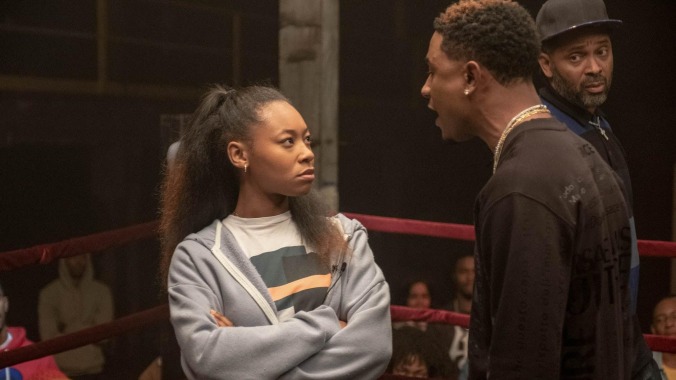Coming-of-age tale On The Come Up follows familiar but rewarding beats
In her impressive directorial debut, actor-turned-filmmaker Sanaa Lathan delivers a poised and upbeat adaptation of The Hate U Give author's second book

From its earliest moments, there is a comforting familiarity to On The Come Up, an upbeat and vibrant coming-of-age movie that follows a fictional teen rapper forced to choose between her identity and career after achieving online fame overnight. But while that familiarity is there in everything—from the protagonist’s soothing voiceover telling her story like a fairytale to the common hallways of her typical high school—there is also undeniable authenticity to actor-turned-director Sanaa Lathan’s confident feature directorial debut. Like The Hate U Give, also adapted from a bestselling book by Angie Thomas, On The Come Up’s protagonist is a fully realized, complex, and resilient Black girl—this time, one who puts her stamp on a field mostly culturally associated with men.
The 16-year-old in question is the gifted rapper Bri (noteworthy newcomer Jamila C. Gray), who has a lot on her shoulders between her studies, her single mother Jay’s (Lathan herself) limited financial resources, and the imposing legacy of her late father, an iconic emcee named Lawless who fell victim to senseless gun violence just as he was beginning to reap the rewards of his burgeoning career. Bri was subsequently forced to grow up faster than she was ready, especially after her mother disappeared to deal with drug addiction. She and Jay reconciled, but unresolved issues generate an undercurrent of tension that perceptive screenwriter Kay Oyegun keeps simmering between them.
All of these elements might at first sound cliché, especially when Jay (briefly) disapproves of Bri pursuing the same profession that caused her husband’s death. But Oyegun and Lathan treat the material with poise and sincerity, making Bri’s journey a rich one worth embarking on as she competes in a local battle rap scene, and eventually begins to yearn for grander achievements outside of her amateur pursuits. She additionally faces hurdles at a school with diversity initiatives that seem progressive, but whose administrators show their true colors by failing to discipline a security officer who assaults and handcuffs Bri for selling candy at school.
Nevertheless, Bri somehow manages to remain above the fray, especially with her supportive, bubbly mentor Aunt Pooh (a scene-stealing Da’Vine Joy Randolph) on one side, and her childhood friend-turned-romantic interest Malik (Michael Cooper Jr.) on the other. But she soon faces a more serious quandary after the former manager of Bri’s dad—now a swanky mogul in the business named Supreme (Cliff “Method Man” Smith)—shows up with a lucrative opportunity to capitalize on her natural way with words and rhymes.
Penned by Grammy-nominated hip-hop artist Rapsody, who provides the entire movie’s poetic lyrics and rhymes, Bri’s song becomes a viral sensation. But do its fictional gangster themes actually represent Bri as an artist and a person? Or is integrity a luxury Bri shouldn’t worry about when even a sliver of success affords her and her mother more financial breathing room than either has ever felt before?
The answer to all the questions of being a sellout is, of course, obvious—and the canvas that surrounds Bri sometimes gets crowded to a fault. But a committed group of dazzling actors keeps viewers consistently engaged until On The Come Up arrives at its predictable life lessons. In particular, the parent-teen chemistry between Lathan and Gray—which is marked both by love and conflict—is especially worthy of attention.
As a shrewd performer of resolute characters—her career-oriented accountant who unexpectedly finds love in the underrated Something New especially comes to mind—Lathan underscores Jay’s regrets and parental ambitions with heartbreaking poignancy. Gray more than matches her reflectiveness with Bri’s vulnerability, concealed beneath a tough façade. Together, they elevate this adaptation from competent to compelling, smoothing out some of the film’s rougher edges with a soft and optimistic take that makes one not only hopeful for Bri, but for Lathan’s next film as a director.